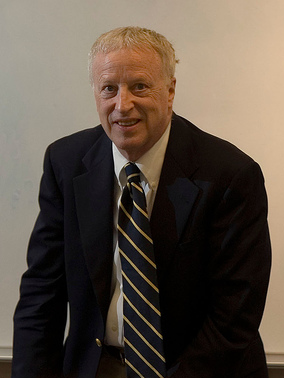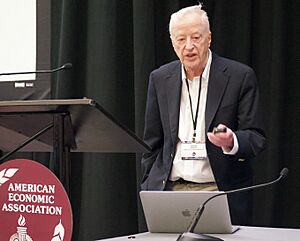George Akerlof facts for kids
Quick facts for kids
George Akerlof
|
|
|---|---|

Akerlof in 2007
|
|
| Born |
George Arthur Akerlof
June 17, 1940 New Haven, Connecticut, U.S.
|
| Spouse(s) |
|
| Institution | Georgetown University London School of Economics University of California, Berkeley |
| School or tradition |
New Keynesian economics |
| Doctoral advisor |
Robert Solow |
| Doctoral students |
Charles Engel Adriana Kugler |
| Influences | John Maynard Keynes |
| Contributions | Information asymmetry Efficiency wages |
| Awards | Nobel Memorial Prize in Economic Sciences (2001) |
| Information at IDEAS / RePEc | |
George Arthur Akerlof (born June 17, 1940) is a famous American economist. He is a professor at Georgetown University and a retired professor at the University of California, Berkeley. In 2001, Akerlof won the Nobel Memorial Prize in Economic Sciences. He shared the prize with Michael Spence and Joseph Stiglitz. They were honored for their ideas about markets where some people have more information than others. George Akerlof is married to Janet Yellen, who used to be the head of the U.S. Treasury.
Contents
Early Life and School
George Akerlof was born in New Haven, Connecticut, on June 17, 1940. His mother, Rosalie Clara Grubber, was from a German Jewish family. His father, Gösta Carl Åkerlöf, was a chemist and inventor from Sweden. George has an older brother, Carl, who is a physics professor.
George went to Princeton Day School and then graduated from the Lawrenceville School in 1958. He studied economics at Yale University and earned his bachelor's degree in 1962. Later, he received his PhD in economics from the Massachusetts Institute of Technology (MIT) in 1966. His main project for his PhD was about "Wages and Capital." His advisor was Robert Solow, another economist who later won a Nobel Prize.
Academic Career
After finishing his PhD, Akerlof started teaching economics at the University of California, Berkeley. He taught there for a year before moving to India. In 1967, he was a visiting professor at the Indian Statistical Institute in New Delhi. He returned to the United States in 1968 and became an associate professor at Berkeley.
From 1973 to 1974, Akerlof worked as a senior economist for the White House Council of Economic Advisers. In 1977, he spent a year working for the Federal Reserve Board of Governors in Washington, D.C. There, he met his future wife, Janet Yellen. They both moved to the London School of Economics (LSE) in 1978 and stayed in the United Kingdom for two years.
In 1980, Akerlof returned to Berkeley as a professor. He taught there for most of his career. In 1997, he took a break from Berkeley to be with his wife when she became the head of the Council of Economic Advisers. They both went back to teaching at UC Berkeley in 1999. Akerlof retired from Berkeley in 2010.
Later, he moved to Washington again when Janet Yellen joined the Federal Reserve Board. Akerlof worked at the International Monetary Fund (IMF) from 2010 to 2014. In 2014, he joined the McCourt School of Public Policy at Georgetown University as a professor.
Key Ideas in Economics
Understanding Information in Markets
George Akerlof is famous for his paper called "The Market for Lemons: Quality Uncertainty and the Market Mechanism" (1970). This paper explained big problems in markets where some people know more than others. This is called asymmetric information. For example, when buying a used car, the seller knows more about the car's problems (the "lemons") than the buyer. This idea helped him win the Nobel Prize.
He also worked with his wife, Janet Yellen, on the idea of efficiency wages. This is when companies pay workers more than the lowest possible wage. They found that paying more can make workers happier and more productive.
Identity Economics
Akerlof and his colleague Rachel Kranton created a new field called identity economics. They suggest that people don't just choose things based on what they like. They also follow social rules about how different people should act. These rules are connected to a person's social identities. Their ideas first appeared in their paper "Economics and Identity" in 2000.
Understanding "Looting" in Business
In 1993, Akerlof and Paul Romer wrote about "Looting: The Economic Underworld of Bankruptcy for Profit." They explained how company owners might sometimes find it more profitable to take money from their company instead of helping it grow. This can happen if there are weak rules or low penalties for bad behavior. For instance, if a government promises to cover a company's debts, owners might take money out and then let the company fail.
Social Norms and the Economy
In 2007, Akerlof talked about "natural norms." These are ideas people have about how they should behave. He showed how these norms can explain why the economy sometimes acts differently from what economic theories predict. Akerlof suggested that understanding social norms is important for studying how the economy works. He is seen as one of the founders of social economics.
He is also involved with groups like Economists for Peace and Security. He is on the advisory board of the Institute for New Economic Thinking. In 1985, he was chosen as a fellow of the American Academy of Arts and Sciences.
Political Views
In June 2024, George Akerlof and 15 other Nobel Prize winners in Economics signed an open letter. They warned that certain economic policies could cause prices to rise in the United States.
Personal Life
George Akerlof was briefly married to an architect named Kay Leong from 1974 to 1977. In 1978, he married Janet Yellen, who is also a famous economist. Janet Yellen was the head of the U.S. Treasury and the former chair of the Federal Reserve.
George and Janet have one son, Robert, who was born in 1981. Robert Akerlof is also an economist. He studied at Yale and Harvard and now teaches economics at the University of Warwick.
In 2018, Akerlof supported Harvard University in a lawsuit about student admissions. Other famous economists, including Janet Yellen, also supported Harvard in this case.
See also
 In Spanish: George Akerlof para niños
In Spanish: George Akerlof para niños
- List of Jewish Nobel laureates
 | Anna J. Cooper |
 | Mary McLeod Bethune |
 | Lillie Mae Bradford |


